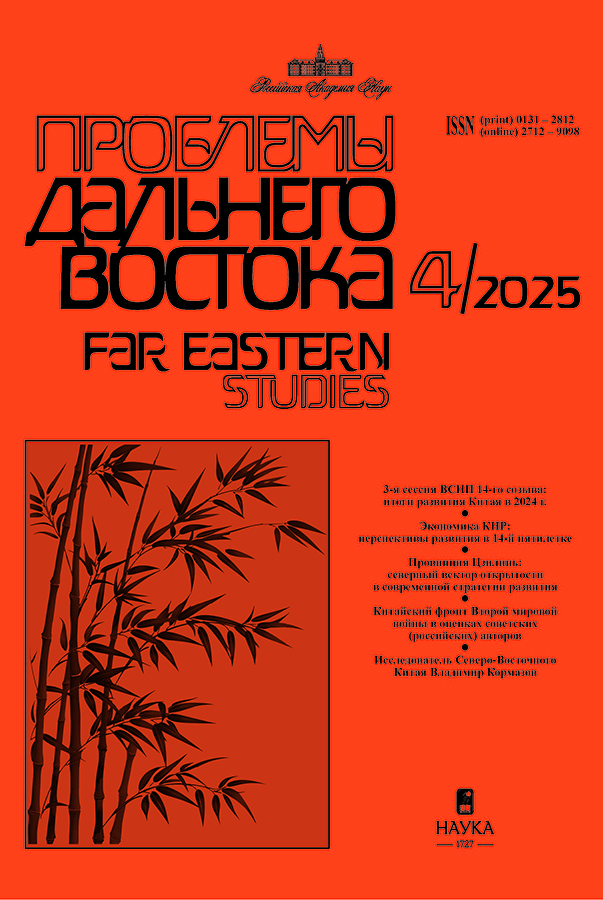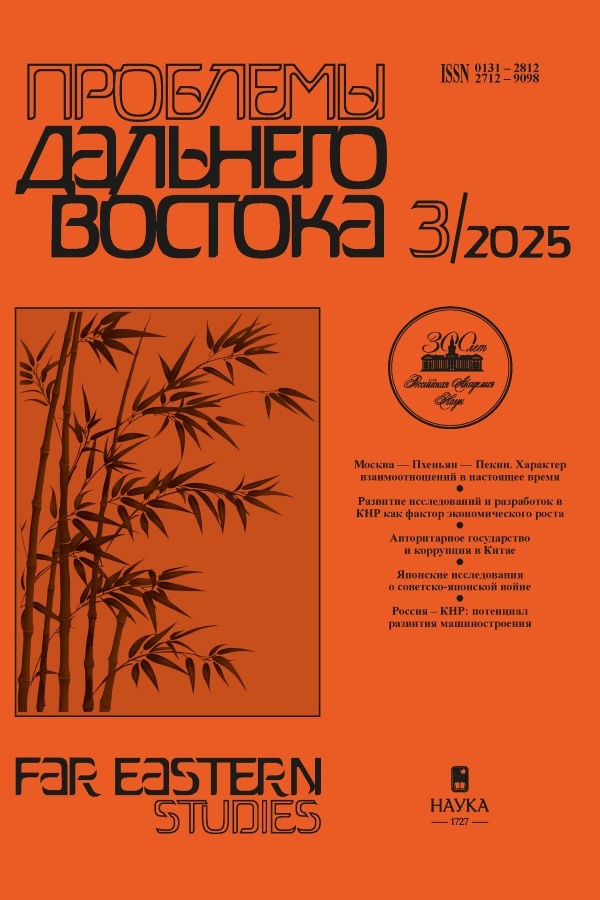Moscow – Pyongyang – Beijing. The Nature of Relations at Present
- Authors: Vorontsov A.V.1
-
Affiliations:
- Institute of Oriental Studies of the Russian Academy of Sciences
- Issue: No 3 (2025)
- Pages: 7-23
- Section: Politics
- URL: https://ruspoj.com/0131-2812/article/view/688435
- DOI: https://doi.org/10.31857/S0131281225030019
- ID: 688435
Cite item
Abstract
In today's rapidly changing environment of strategic rifts in the world, the relations between the three neighboring states identified in the title of the article are also dynamically evolving and being filled with new content. Since the establishment of the DPRK and the PRC, the interaction between them, although not cloudless at times, has generally remained close, defined by good-neighborly partnership and, at certain stages, even allied obligations. In the face of new challenges to their security posed by the United States and its allies, in recent years the three states under consideration have objectively had additional grounds for strengthening cooperation with each other. The actual rapprochement of the three mainland states and the existence of a fundamental prerequisite for its further deepening in the form of a varying degree of hostile policy on the part of the U.S. toward all three mentioned states has seriously concerned U.S. strategists and stimulated the focus of close attention to the study of this phenomenon in order to find ways to separate the members of this "troika" from each other. At the same time, one cannot deny the objective fact that the rapid growth of the Russian-North Korean relations has aroused close attention in China, including in its expert community, in some segments of which different approaches to this phenomenon, including certain concerns, have manifested themselves. The conclusion is that the it is realistic that there are objective divergences of interests of the three countries on some specific issues, which, of course, require joint heightened and sensitive attention. Therefore, Moscow, Beijing and Pyongyang should by no means underestimate the possible negative effect of these factors and should further improve both the quality of bilateral consultations and the level of coordination of their actions on the Korean Peninsula, in the Northeast Asia region and in the world as a whole.
Keywords
About the authors
Alexander V. Vorontsov
Institute of Oriental Studies of the Russian Academy of Sciences
Email: vorontsovav@yandex.ru
Ph.D. (History), Head of the Department of Korea and Mongolia 12, Rozhdestvenka Str., Moscow, 103753, Russian Federation
References
- Декларация Вашингтонского саммита, выпущенная главами государств и правительств стран НАТО, участвовавшими в заседании Североатлантического совета в Вашингтоне, округ Колумбия, 10 июля 2024 года // North Atlantic Treaty Organization. URL: https://www.nato.int/cps/en/natohq/official_texts_227678.htm (дата обращения: 26.05.2025).
- Заявление Президента Российской Федерации. 28.04.2025 // Президент России. URL: http://kremlin.ru/events/president/news/76805 (дата обращения: 26.05.2025).
- Кашин В. Друг на замену: беспокоит ли Пекин сближение Москвы и Пхеньяна // Профиль. № 27–28 (233). URL: https://profile.ru/abroad/drug-na-zamenu-bespokoit-li-pekin-sblizhenie-moskvy-i-phenyana-1548143/(дата обращения: 18.07.2024).
- Речь уважаемого товарища Ким Чен Ына, произнесенная во время поздравительного визита в посольство РФ в КНДР // ЦТАК. 10.05.2025. URL: http://www.kcna.kp/ru/article/q/abc1118037a7138e04e12d49c38663d1.kcmsf (дата обращения: 26.05.2025).
- Совместное заявление Российской Федерации и Китайской Народной Республики о дальнейшем углублении отношений всеобъемлющего партнерства и стратегического взаимодействия в новую эпоху. 8 мая 2025 года // Президент России. URL: http://kremlin.ru/supplement/6309 (дата обращения: 26.05.2025).
- National Security Strategy of the United States of America // The White House. December 2017. 55 p. URL: https://trumpwhitehouse.archives.gov/wp-content/uploads/2017/12/NSS-Final-12-18-2017-0905.pdf (дата обращения: 26.05.2025).
Supplementary files











